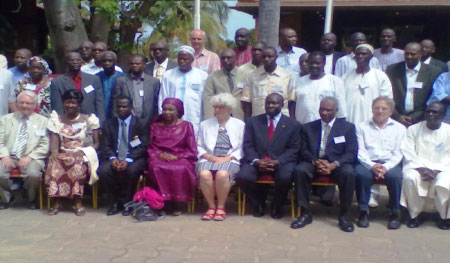
A three-day regional forum of stakeholders and expert planning for the development of a 10-year strategic plan (2012-2022) of the International Trypanotolerance Centre (ITC) began yesterday at the Kairaba Beach Hotel.
The objectives of the forum include harvesting and developing knowledge, concerns, opinions and suggestions to inform the strategic choices the institution has to make including programme content and delivery mechanisms.
ITC was established in 1982 by an Act of Parliament of The Gambia. It was mandated to contribute to the on-going efforts to increase livestock productivity and utilization in the West African region through the optimal and sustainable exploitation of the genetic resistance of indigenous breeds of livestock for the welfare of human populations.
Speaking at the opening ceremony, the Minister of Agriculture, Solomon Owens, said the ITC must continue to respond to the development aspirations of its targeted beneficiaries, and contribute significantly to the achievement of their development goals.
In this regard, Minister Owens noted that a pertinent global objective of the institution would be to contribute meaningfully to the achievement of the MDG, especially MDG1 of eradicating extreme poverty and hunger.
According him, recent reports suggest that globally, the world is on track to meeting the target of halving the proportion of people living on less than $1a day, but the reports also noted that much of the progress achieved has been due to significant success in Asia and little progress has also been made in reducing poverty in sub-Saharan Africa.
“There is therefore a lot of work to be done to contribute meaningfully to meeting these targets,” said Mr Owens. He further said a regional organisation like ITC must focus on and address development bottlenecks that are well identified in both the continental comprehensive Africa Agriculture Development Programme (CAADP) and the Regional Agricultural Policy for West Africa (ECOWAP).
“In ECOWAS region, livestock contributes over 40% to the Agricultural Gross Domestic product,” said the Agric minister.
However, he said, it is clear that the livestock sector does not receive research and or policy support to commensurate with this contribution to the national well-being.
He also called on them to address the weakness to ensure they receive policy and financial support to commensurate with their contributions to the national growth.
The agric minister informed the gathering that an evaluation of ITC carried out by an AU-IBAR mission in 2007 recommended that the institution be formally transformed into a regional centre embedded within ECOWAS.
He added that the governing council of ITC and the Government of The Gambia are currently working with the ECOWAS Commission to implement the recommendation.
He finally recommended that participants consider among others the generation of regional public goods, especially in the policy domain, strong capacity building programme and appropriate governance and management structure as well as a solid and realistic financing strategy so that they are featured appropriately in the revenant parts of the strategic plan.



